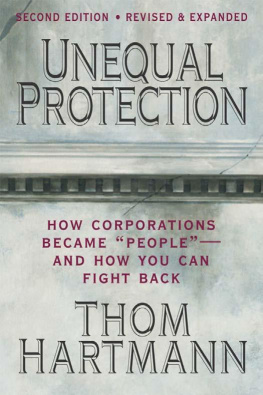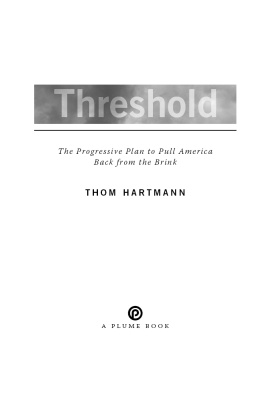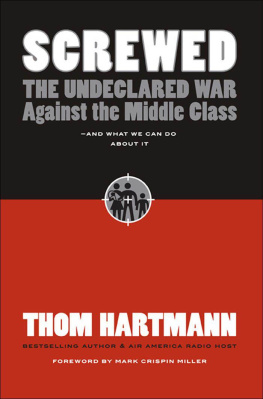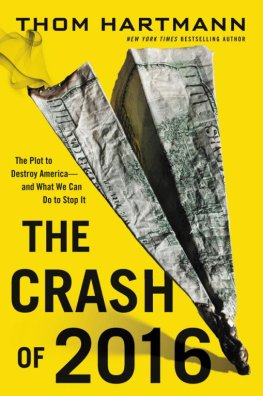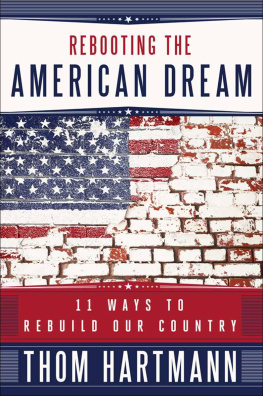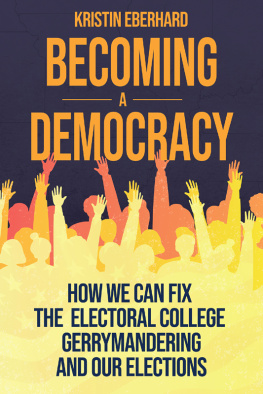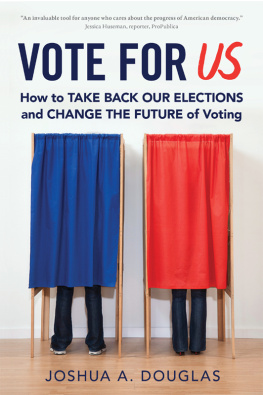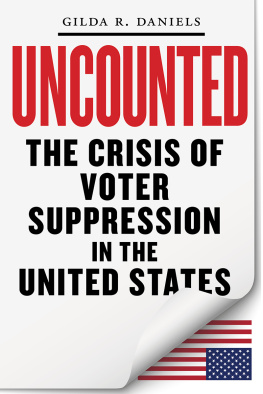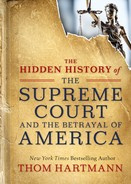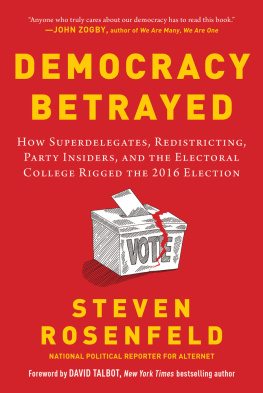The Hidden History of the War on Voting

The Hidden History of the War on Voting
Copyright 2020 by Thom Hartmann
All rights reserved. No part of this publication may be reproduced, distributed, or transmitted in any form or by any means, including photocopying, recording, or other electronic or mechanical methods, without the prior written permission of the publisher, except in the case of brief quotations embodied in critical reviews and certain other noncommercial uses permitted by copyright law. For permission requests, write to the publisher, addressed Attention: Permissions Coordinator, at the address below.

| Berrett-Koehler Publishers, Inc.
1333 Broadway, Suite 1000
Oakland, CA 94612-1921
Tel: (510) 817-2277, Fax: (510) 817-2278
www.bkconnection.com |
Ordering information for print editions
Quantity sales. Special discounts are available on quantity purchases by corporations, associations, and others. For details, contact the Special Sales Department at the Berrett-Koehler address above.
Individual sales. Berrett-Koehler publications are available through most bookstores. They can also be ordered directly from Berrett-Koehler: Tel: (800) 929-2929; Fax: (802) 864-7626; www.bkconnection.com
Orders for college textbook/course adoption use. Please contact Berrett-Koehler: Tel: (800) 929-2929; Fax: (802) 864-7626.
Distributed to the U.S. trade and internationally by Penguin Random House Publisher Services.
Berrett-Koehler and the BK logo are registered trademarks of Berrett-Koehler Publishers, Inc.
First Edition
Paperback print edition ISBN 978-1-5230-8778-5
PDF e-book ISBN 978-1-5230-8779-2
IDPF e-book ISBN 978-1-5230-8780-8
Digital audio ISBN 978-1-5230-8781-5
2019-1
Book production: Linda Jupiter Productions; Cover design: Wes Youssi, M.80 Design; Edit: Elissa Rabellino; Proofread: Mary Kanable; Index: Paula C. Durbin-Westby
To my grandson, Arthur.
May he grow up in a nation that
once again values democracy.
CONTENTS
INTRODUCTION
The Heartbeat of Democracy
Your vote is the most important part of the American commons.
The commons embrace those realms that we all own and jointly administer through our government. They include our air and water; our roads and skyways; the frequency spectrum we use for communication, radio, and television; our public school system; our military, police, and fire departments; the agencies we use to ensure the safety and quality of our food and medications; the systems and laws that keep people playing the game of business within legal boundaries; our jails and prisons; our oceans and public lands; and our social safety netamong other things.
In this era of rapid climate change, our atmosphere and oceans, which absorb 95 percent of the extra heat in our atmosphere, are the most critical of our commons, because they have the potential, through destabilization of weather and sea level rise, to destroy civilization and even to render our planet sterile of human life.
Because government is the tool we use to define, protect, and care for most all of our commons, government could be said to be the most important of all our commons.
And because the vote is how we determine who runs our government and what policies are employed, the vote stands as the single most important part of the commons, above even
Today in the United States there is a concerted and well-organized campaign to prevent some people from voting while making it more and more convenient for others. At the core of this effort are think tanks, media, publications, pundits, and politicians entirely owned or heavily influenced by a relatively small group of billionaires and corporations whose wealth and business models depend on despoiling and/or exploiting the commons for profit.
This group, operating loosely under the rubric of the Republican Party, has worked for decades to deceive people into thinking that poorly paying nonunion jobs represent freedom, that lack of health care is liberty, that protection of the environmental commons is despicable regulation, and that people working to encourage others to participate in our democracy by voting (like, for example, the League of Women Voters) are engaging in voter fraud and should be harassed or prosecuted out of existence.
Todays right-left battle was seeded in 1971 when Lewis Powell, the year before Richard Nixon put him on the Supreme Court, wrote his infamous memo to the US Chamber of Commerce, imploring the very wealthy and big business to get politically active. He explicitly called for a vigorous effort to take over the court system of America, which he believed was being used way too often against business and the rich by environmentalists and consumer activists like Rachel Carlson and Ralph Nader (whom he calls out early in the memo) and the ACLU.
Realizing that the Supreme Court had engaged in a massive power grab in 1803 with the Marbury decision (an entire other story in its own stead thats told in The Hidden History of the Supreme Court and the Betrayal of America), he knew that the nine justices had become, essentially, the new kings and queens of America with the power to second-guess and thus strike down laws passed by Congress and signed by the president, as well as create law from whole cloth (as the Court did in Dred Scott and Plessy, among others). Powell wrote,
Under our constitutional system, especially with an activist-minded Supreme Court, the judiciary may be the most important instrument for social, economic and political change.
Other organizations and groups, recognizing this, have been far more astute in exploiting judicial action than American business. Perhaps the most active exploiters of the judicial system have been groups ranging in political orientation from liberal to the far left.
The American Civil Liberties Union is one example. It initiates or intervenes in scores of cases each year, and it files briefs amicus curiae in the Supreme Court in a number of cases during each term of that court. Labor unions, civil rights groups and now the public interest law firms are extremely active in the judicial arena. Their success, often at business expense, has not been inconsequential.
This is a vast area of opportunity for the Chamber, if it is willing to undertake the role of spokesman for American business and if, in turn, business is willing to provide the funds.
His memo activated a group of previously disparate conservative billionaires and their foundations, from Scaife to Coors to the Kochs. And when, two years later, the Court struck down anti-abortion laws with Roe, this group went into hyperdrive.
As Powell wrote, There should be no hesitation to attack the Naders, the Marcuses and others who openly seek destruction of the system. There should not be the slightest hesitation to press vigorously in all political arenas for support of the enterprise system. Nor should there be reluctance to penalize politically those who oppose it.
Employing strategies laid out by operatives such as Jude Wanniski (the Two Santa Clauses plan), Paul Weyrich (I dont want everyone to vote), and Paul Manafort (who helped supervise the electoral strategies, including massive voter suppression, used by Presidents Gerald Ford, Ronald Reagan, George H. W. Bush, Bob Dole, and Donald Trump), preventing undesirable people from voting has become central to Republican victories for the past two generations.
Next page

